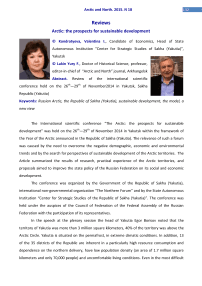Arctic: the prospects for sustainable development
Автор: Kondratyeva Valentina I., Lukin Yury F.
Журнал: Arctic and North @arctic-and-north
Рубрика: Reviews and reports
Статья в выпуске: 18, 2015 года.
Бесплатный доступ
Review of the international scientific conference held on the 26th—29th of November2014 in Yakutsk, Sakha Republic (Yakutia)
Russian Arctic, the Republic of Sakha (Yakutia), sustainable development, the model, a new view
Короткий адрес: https://sciup.org/148318749
IDR: 148318749
Текст статьи Arctic: the prospects for sustainable development
The International scientific conference “The Arctic: the prospects for sustainable development” was held on the 26th—29th of November 2014 in Yakutsk within the framework of the Year of the Arctic announced in the Republic of Sakha (Yakutia). The relevance of such a forum was caused by the need to overcome the negative demographic, economic and environmental trends and by the search for perspectives of sustainable development of the Arctic territories. The Article summarized the results of research, practical experience of the Arctic territories, and proposals aimed to improve the state policy of the Russian Federation on its social and economic development.
The conference was organized by the Government of the Republic of Sakha (Yakutia), international non-governmental organization “The Northern Forum” and by the State Autonomous Institution “Center for Strategic Studies of the Republic of Sakha (Yakutia)”. The conference was held under the auspices of the Council of Federation of the Federal Assembly of the Russian Federation with the participation of its representatives.
In the speech at the plenary session the head of Yakutia Egor Borisov noted that the territory of Yakutia was more than 3 million square kilometers, 40% of the territory was above the Arctic Circle. Yakutia is situated on the permafrost, in extreme climatic conditions. In addition, 13 of the 35 districts of the Republic are inherent in a particularly high resource consumption and dependence on the northern delivery, have low population density (an area of 1.7 million square kilometers and only 70,000 people) and uncomfortable living conditions. Even in the most difficult years for Russia, the authorities of the Republic of Sakha (Yakutia), constantly focused their attention on the problems of people living in the Arctic.
Picture 1.The head of the Republic Egor Borisov
URL:
The year 2014 was called the Year of the Arctic in Yakutia. The Republic is actively involved into solving its major problems: improving the quality of life of the population and the development of life-support systems: transport, energy, housing and communal infrastructure, information and communication. Construction of social and engineering facilities and modernization of housing are continued. The Federal Arctic Research Center was established in Tiksi aimed at development and application of new technologies and materials adapted to the climatic conditions of the Arctic. The railway line to Yakutsk is done, the development of navigation and the revival of the seaport Tiksi allows the creation of long-term transport corridor from Asia to Europe.
A special executive body — the State Committee for the Arctic was established to consolidate the efforts of the executive authorities and civil society for the development of the Arctic in the Republic of Sakha (Yakutia). Also the Institute of the Commissioner for Indigenous
Peoples Rights is introduced in Yakutia and got positive feedback from the international expert community1.
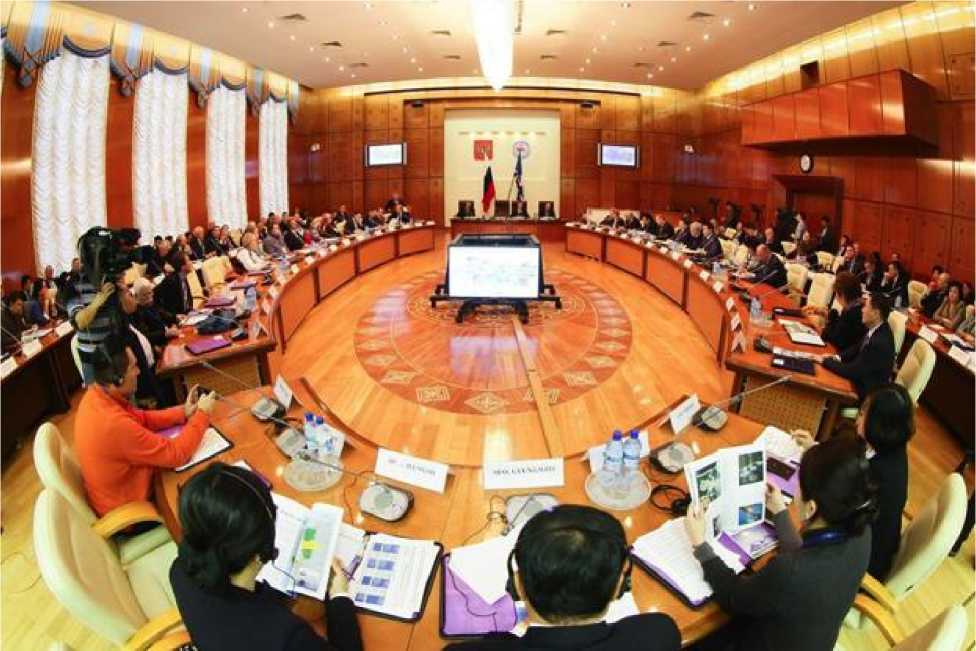
Picture 2. URL:
President of the Inter-regional public organization “Association of polar explorers”, Special Representative of the President of the Russian Federation for International Cooperation in the Arctic and Antarctic A.N. Chilingarov drew the public attention to the fact that the national security, the preservation of the Northern Sea Route, the optimization of exploration and development of offshore fields, environmental issues, the integrated study of the Arctic - were extremely important issue with no effective solutions. The problem of interaction between the federal and regional levels of government reminds unsolved as well. Arctic strategy legislation and the federal law “On the Arctic zone of the Russian Federation” are not ready. The rights of indigenous peoples of the North have some unsolved issues and a federal agency for the Arctic and Antarctic is still not working. Practical problem of every northern regions were discussed at the conference.
The head of the Republic Egor Borisov awarded Artur Chilingarov the State Prize of the Republic of Sakha (Yakutia) named after M.K. Ammosov in public governance in 2014.
At the plenary session the first President of the Republic of Sakha (Yakutia), the deputy of the State Duma of the Russian Federation M.E. Nikolaev, director of the Center of the economy of the North and the Arctic Council for Study of Productive Forces A.N. Pilyasov, Deputy Chairman of the UN Expert Committee on Indigenous Issues A. Tsykarev, the governor of Lapland Mika Riipi, cochairman of the Arctic Energy Summit Nils Andreassen (Institute of the North, USA), representatives of the Murmansk region, the Government of Moscow and South Korea were represented.
The total number of participants — more than 400 people from 9 countries (Sweden, Italy, South Korea, Norway, Finland, Slovakia, USA, France, Japan) and 14 regions of Russia (Moscow, St. Petersburg, Krasnoyarsk, Magadan, Tyumen, Voronezh, Novosibirsk, Tomsk, Khabarovsk, Vladivostok, Rybinsk, Perm, Republic of Karelia, Orenburg) reflected the special interest of the Russian and international community toward the issued discussed at the conference. It has become a significant event for the scientific community, higher education, enterprises and other organizations of Yakutia.
The conference was held as 10 round table discussions on key issues of development of the Russian Arctic:
-
1. “Comprehensive study of the territorial development: historical experience and modern approaches ”held together with the North-Eastern Federal University named after M. K. Ammosov within the scientific conference “Adaptation of human society and the Arctic regions to climate change and globalization”.
-
2. “Human potential and quality of life in the Arctic”.
-
3. “Ecology and development of mineral resources”.
-
4. “Transport mobility, experience in the organizing and delivery routes in the Arctic”.
-
5. "The Arctic: Technology Energy and Utilities".
-
6. “The introduction of information and communication technologies in the Arctic”.
-
7. “Innovation in Arctic building industry”
-
8. “Conservation of traditional ways of life and traditional economic activities of the peoples of the Arctic”.
-
9. “Arctic tourism”.
-
10. “Arctic model of sustainable development: a new perspective”.
The round table discussions were moderated by a Deputy Chairman of the Federation Council on the federal structure, regional policy, local government and Northern Affairs A.K. Akimov; DG of JSC “National Center for Life” V.N. Bobkov; professor of the University of Aix-
Marseille (France) Sébastien Gadal; Advisor of the Director of the National Park “Russian Arctic” V.S. Kuznetsov; Senior Researcher, Institute for Economic Research, Far Eastern Branch of the Russian Academy of Sciences S.N. Leonov and others. At the final meeting of each round table discussion the moderators pointed out the main proposals and recommendations of the round table discussions included into the draft of the Resolution.
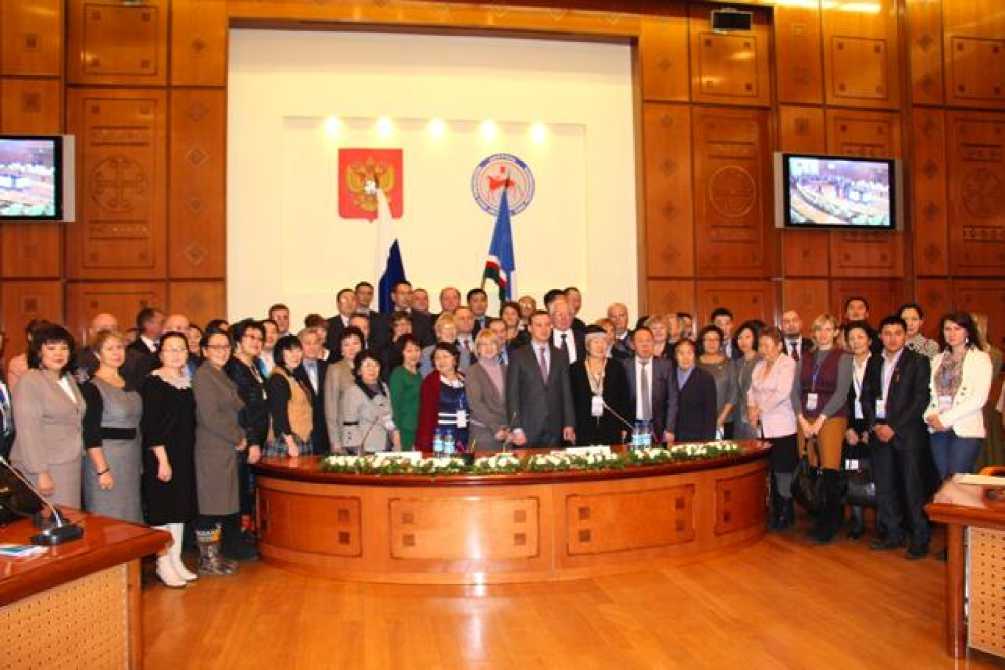
Picture 3. URL:
Within the framework of the Conference, a specialized company “Yakutskaya Yarmarka” and Chamber of Commerce and Industry of the Republic of of Sakha (Yakutia) held an exhibition“Technologies of the Arctic”. The opening of the exhibition was attended by the Permanent Representative of the RS(Ya) under the President of RFA.A. Struchkov, Minister for federative relations and External Relations of the RS(Ya) V.N. Vasiliev, the governor of Lapland Mika Riipi, chief of department on Marketing of the Bureau for Convention and Visitors of the Kangwon province of South Korea Xing Jong Mi, the President of of Commerce-industrial Chamber of RS(Ya), people's deputy of the State Assembly (Il Tumen) of the RS(Ya) V.M. Chlenov. The exhibition represented the areas vital for the Arctic: construction and building materials, energy and housing-and-municipal economy, transport and transport communications, the mining industry and geological servey, agriculture, traditional crafts, communications and telecommunications, ecology and human health in the conditions of a cold climate. There were 57
participants from the Republicof Sakha (Yakutia), as well as from the Republic of of Korea (province Kangwon), Kemerovo and Kazan. Scientific developments were presented by the Institute of Oil and Gas, the Institute of physico-technical problems named after V.P. Larionov, Research Institute of Applied Ecology of the North, North-Eastern Federal University named after M.K. Ammosov. Arctic State Institute of art and culture, College of Technology and Design, bodies of local selfgovernment have demonstrated the culture and creativity of the peoples of the North. Participants of the exhibition were such a well-known Yakut brands, as a factory of basalt materials “Sahabazalt”, FAPK “Yakutia”, GK “Skif”, Fishing Company “Fish of the Arctic”,“Chokurdakhsky” fish plant, jewelry companies “SahaDesign” and “Kierge”. Some important contracts on deliveries of equipment were digned. Participants and visitors expressed the wish to hold the exhibition annually.
The final Resolution has become the most important document that contains about 70 specific proposals on wide range of issues in the the field of state Policy of the Russian Federation in the Arctic, development of international relations and civil initiatives (published on the website of “Arctic and North” journal in the “Arctic encyclopedia”):
-
> To hasten the adoption of the Federal Law “On the Arctic zone of of the Russian Federation” and to underline the importance of the strategic planning of socio-economic development of the Arctic macroregion of theRussian Federation, consider it as a priority by distinguishing between the concepts “the Arctic” and “the North” and “the Far North”. To develop models of sustainable socio-economic development of regions in the Arctic zone of the Russian Federation.
-
> To decide on creation of at the federal level of a special coordinating body on state policy in the Arctic, including the issues of small-numbered indigenous peoples of the North. To recognize the sphere of economic activity of ethnoses of the North of the Arctic zone of of the Russian Federation as the special ethno-economic activities and a special object of of the state policy and management.
-
> To create the flexible system of of financial mechanisms of development of the Arctic territories, including a tax stimulating system and customs of tools for infrastructural investment projects and new business projectsin the Arctic (the exemption from paying the property tax, import customs duties and VAT) and for the newly created small business in the AZRF (exemption paying income taxes during the first three years, property tax, land tax, VAT and enter a bet in the amount of 1% available at special tax regimes).
-
> Support the legislative initiative of the Republic of of Sakha (Yakutia) on the amendments to the Federal Law “On the Fundamentals of health protection of citizens in the Russian Federation” in the part about the primary medical care at the 24-hour hospitalin areas of the Far North and the establishment of the special state program of free medical care with the regard to the density and dispersal of the settlements.
-
> To ensure the transport accessibility and transport infrastructure for the development of tourism in the Arctic zone of the Russian Federation, interregional cooperation between the Arctic territories in the creation the unified tourist brands and projects.
-
> To adopt the Law of the Russian Federation “On renewable energy sources” to introduce the renewable energy sources. To provide measures on the State promotion of generation objects constructions, using renewable sources of energy.
The Arctic zone of the Yakutiaconsists 13 municipal formations with the same climatic conditions, low population density, high resource intence and dependence on the delivery of goods. Because of the uncomfortable environmental conditions, Yakutia insists on entering of all 13 districts in the Arctic zone the Russian Federation (Decree of the President of Russia from 02.05.2014 № 296:only 5 areas of Yakutia, directly adjacent to the Arctic Ocean, are considered as the Russian Arctic territories). Editors of the “Arctic and North” journal support such an approach.
The Resolution contains some proposals on social issues (education, health, sport, social protection, culture of the small-numbered peoples of the North); on development of transport, energy, communal, information-communication infrastructure (financial support of the air transport, the acquisition of aircrafts and river vessels, creation of multifunctional space system “Arktika”), on delivery of goods, necessary for the population in the Arctic.
Preservation of traditional economy and traditional lifestyles should contribute to recommendations in the sphere of agriculture, envorinmentalmanagement and ecology; development of national sports; adoption of the Federal Laws “On reindeer husbandry” and“About the state support of the small-numbered indigenous peoples of the North, Siberia and the Far East of the Russian Federation”; the development of the federal target program on support of the small-numbered indigenous peoples of the North; complex estimation of ecological, economic and social impact of the state strategies and programs for the development of the North, Siberia and the Far East, the the areas adjacent to these territories of the sea shelf and indigenous lands;mandatory ethnological expertise of the places of indigenouspeople’s residence and economic activity. It was suggested to join the efforts of the northern territories to create the Interregional Book Catalog of the indigenous people’s of the North, Siberia and the Far East and to fill the Electronic Library and other summary resources at the web page of the small-numbered peoples of the North “Knigakan”.
More detailed information on the conference (press releases on round table discussions, abstracts, list of participants, photo and video materials and the Resolution) could be found at the web page:
Round table discussions’ materials International conference “Arctic: propones of the sustainable development”
Moderates of the round table discussion “Complex study of the development of territories: historical background and contemporary approaches” were: the Permanent Representative of the Republic of Sakha (Yakutia) under the President of the Russian Federation A.A. Struchkov; Doctor of Technical Sciences., corr. of the Russian Academy of Sciences, Chairman of the Presidium of the Yakut Scientific Center of the Russian Academy of Sciences, Director of the Institute of Physical and Technical Problems of the North SB RAS M.P. Lebedev; Candidate of Geographical Sciences, ViceRector of the North-Eastern Federal University named after M.K. Ammosov M.Y. Prisiazhny.
The round table discussion was attended by the President of the “Snowchange” organization (Finland); Arctic explorer Tero Mustonen; Professor of the Hokkaido University (Japan) Tatsuzava Shiro; Deputy Minister of Natural Resources and Environment of the Magadan P.E. Tikhmenev; Doctor of Science, DG of JSC “Fundamentproject” (Moscow) F.M. Rivkin; Candidate of Geographical Sciences,Senior research fellow of the department of environmental management, Faculty of Geography, Moscow State University named after M.V. Lomonosov E.L. Vorobievskaya; representatives of local governments of the Arctic and northern regions, research organizations, educational institutions, executive authorities, graduate students and university students.
There was discussion of modern methods of research with the regard to the great historical experience. Participation of the best representatives of the scientific and expert community and the application of advanced scientific technology are the foundation for a brand new development in the Northern and Arctic regions. Permanent Representative of the Republic of Sakha (Yakutia) under the President of the Russian Federation A.A. Struchkov noted that the North-East region and the Pacific coast of Russia have had the greatest interest for the local research community. In the XVIII century the first and the second Kamchatka expedition were carried out. In the XIX century outstanding research of the North and East Siberia was carried out by the member of the St. Petersburg Academy of Sciences A.F. Middendorf. The initiative of the chairman of the SNK YASSR M.K. Ammosov lead to the research expedition of the Russian Academy of Sciences — the 1stYakut Academic expedition aimed to study the productive forces of Yakutia in 1925—1930. The purpose of the expedition was to study the nature of the North and the people— its economic and social situation. The head of the Republic of Sakha (Yakutia) E.A. Borisov initiated the 2nd Complex Scientific Expedition in April. The proposal was supported by Russian President Vladimir Putin and today it has developed the guidelines for the expedition.
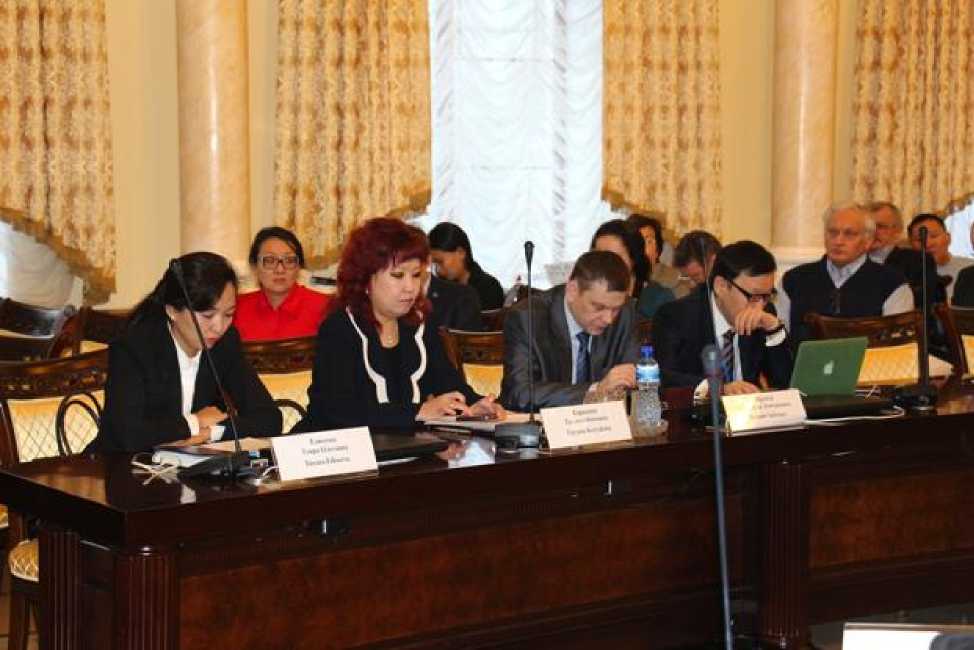
Picture 4.URL:
Chairman of the Presidium of the RAS YSC M.P. Lebedev presented the draft of the “Concept of integrated research of the Russian Academy of Sciences to study the economic and human potential of the Republic of Sakha (Yakutia) for 2015—2020”. DG of “Fundamentproject”(Moscow), Doctor of geological and mineralogical sciences F.M. Rivkin presented a specialized geo-information cartographic model of engineering and geologists conditions as a basis for spatial planning and environmental management in hard northern environment. Specialized geo- information system is actually a tool for scientific support of the projects. It allows the anticipatory assessment of the conditions, methods and cost of the project and is useful for taking timely decisions aimed to improve the regulatory framework of research, design and building. The results of the environmental studies of the central part of the Kola Peninsula, a map of natural and cultural heritage, the dynamics of economic activity of the study area were analyzed in the report of the k.g.n. E.L. Vorobyevskaya.
In general, the speakers noted that the characteristic feature of the modern world and its economic development was the transition of the leading countries to a new stage of an innovative society meant building an economy based on the generation, dissemination and use of scientific knowledge mainly. Today's global challenges highlight the importance of the advanced development of certain scientific research areas and technological development (“clean” energy, genomic medicine, new technologies in agriculture and a number of other areas)and some ofthem do not have a good start in our country.
The round table discussion “Human potential and the quality of life in the Arctic” was devoted to a new paradigm of social policy aimed at sustainable socio-economic development of the Arctic, creating favorable conditions for demographic and social reproduction of the population in the North. In recent years there had been a number of positive trends: an increase in fertility and life expectancy, wage growth and poverty reduction. However, it is impossible to stop the migration outflow and to attract highly qualified personnel without the development of social infrastructure, the use of government support measures and the system of additional benefits and preferences for the population of the North.
The moderators of the meeting were: Doctor of Economical Sciences, member of the Federation Council of the Federal Assembly of the Russian Federation, Deputy Chairman of the Federation Council Committee on the Federal Structure, Regional Policy, Local Government and Northern Affairs A.K. Akimov; Deputy Prime Minister of the Republic of Sakha (Yakutia) A.P. Dyachkovsky; Doctor of Economical Sciences, Professor, DG of JSC “National Center for Life Level” V.N. Bobkov.
Opening the round table discussion, moderator A.K. Akimov outlined the range of fundamental problems: “Arctic zone of our country was fast developed area. In the areas there are working gold mines, seaport in Tiksi and Komsomol construction sites. Our region was attractive for the strong young people, there were families, and children were born. But due to the wrong policies everything was destroyed in a very short time. Therefore, I believe that today the first thing you need to solve is the problem of support of the people in order to deal with issue of development of the Arctic. To address issues related to the development of the Arctic, it is necessary to develop a regulatory framework. And therefore it is necessary to hear the views of scientists, experts and public to reach a consensus on mechanisms for the implementation of laws and policies”. The Minister of Labour and Social Development of the Republic of Sakha (Yakutia) A.N. Druzhinin underlined the issue of the migration outflow of the most active population of working age, the reduction reproduction of the population, high level of poverty and the disparity of social infrastructure to modern requirements.
Some other speeches were on the demographic potential and reproduction of the Arctic population, quality of life, behavior strategies of the youth of the North Yakutia, the revival of traditions, problems of training the highly qualified personnel in Yakutia, pensions for persons employed in the traditional industries of the North, housing and communal living conditions in the Arctic and comfort of living in the Arctic villages of Yakutia. The report of S.A. Sukneva, Doctor of Economical Sciences, deputy director of the Institute of Regional Economy of the North NEFU named after M.K. Ammosov, was devoted to the demographic potential and reproduction of the population of the Arctic zone of Yakutia. The author stressed the importance of structural features and ethnic identity of the population of the Arctic formed due to a significant influx of migrants, as well as the high birth rate as a result of the persistence of traditional models of demographic behavior of indigenous peoples living in these territories.
Similar to the Republic of Sakha (Yakutia) problem of prservation of human resources exist today in the Magadan region. According to Natalia Galtseva, Doctor of Economical Sciences, associate professor and a member of the Research Institute named after N.A. Shilo, the Magadan region has the largest percentage loss of population throughout the Far Eastern Federal District caused by the low ratio of per capita income compared to the other Russian territories and problems with housing.
The round table discussion ” Ecology and the development of the mineral resource base” was devoted to development of the natural resources in the Arctic, maintaining the region as a global environmental resources base of the planet. Yakutia is the most convenient starting point for the development of the Arctic. Prospective oil and gas areas of the northern slope of the Anabar Shield, unique niobium rare metal deposit “Tomtor”, large deposits of diamonds and coal form the Olenek Anabarsky mining cluster. It is also possible create the Lower Yansky cluster basedon the gold mining deposit “Kyuchus”, gold and rare metal of the Kular district, tin deposits and the Chokurdahskoy shelf deposits and the Zyryansky coal basin. In this case, in terms of industrial development, especially oil and gas extraction, Arctic is one of the most complex regions in the world. The ability to eliminate the consequences of emergency situations is complicated by the polar night, numerous storms with high waves, dense fog, ice and possible collisions with icebergs.
The moderators of the round table discussions were: Deputy Chairman of the State Assembly (Il Tumen) of the Republic of Sakha (Yakutia) A.A. Dobryantsev; Minister of Nature
Protection of the Republic of Sakha (Yakutia) S.M. Afanasiev; Doctor of geological sciences, professor, Director of the Institute of Geology of diamonds and precious metals of the SB RAS V.Y. Fridovsky.
The first part of the round table discussion was devoted to the development of mineral resource base of the northern and arctic regions of the Far North-East of Russia, including geology and petroleum potential prospects of the Arctic Yakutia, the mineral resource potential of the “Tomtor” deposits, diamond deposits in the Arctic, the resources of the mammoth fauna. New technologies and processing of minerals, adapted to Arctic conditions and prospects of the development of offshore subsea technology for tin placers in the Russian Arctic got a great interest and attention. N.A. Goryachev, director of the North-East Interdisciplinary Research Institute named after N.A. Shilo, Doctor of Economical Sciences, corr. of the Russian Academy of Sciences and Doctor of Economical Sciences N.V. Galtseva assessed the potential and prospects of the mineral resource base development in the northern and arctic regions of the Far North-East of Russia. They also spoke about the importance of providing benefits for SEZ in case of state financial support.
In the second part of the round table discussion introduces a wide range of issues related to environmental protection and rational use of natural resources in the Arctic. The tripartite agreement on cooperation between the Ministry of Nature Protection, the Ministry of entrepreneurship and the development of tourism of the Republic of Sakha (Yakutia) and the National Park “Russian Arctic” was signed there.
The round table discussion “Transport mobility, experience in organization and delivery schemes of cargoes in the Arctic” At the round table "Transport mobility, experience in organization and scheme of delivery of cargoes in the Arctic," discussed the development of transport infrastructure of the Arctic territories. On the one hand, the cross-polar air bridge passes through the Arctic (the shortest route between North America and Asia) and the Northern Sea Route too— the shortest sea route between East Asia and Europe. It is assumed that the melting of ice in the Arctic Ocean will turn it into an important all year-round transport route. On the other hand, a high degree of isolation from major industrial centers because of the undeveloped and seasonal transportation does not allow the development of medium and small business in the Arctic. Support of the remote settlements is carried out under difficult circumstances and requires significant public funds. Unfortunately, the practice of delivery poses a threat to national economic security in the Arctic because of the lack of fixed links to the national road network. Because of the high proportion of transport costs in the total cost of the products sold in the Arctic, it is necessary to restore central northern delivery of goods and governmental support.
The moderators of the round table discussion were: Minister of Transport and Roads of the Republic of Sakha (Yakutia) S.V. Vinokurov and Candidate of Economical Sciences, Director of the Financial and Economic Institute of the North-Eastern Federal University named after M.K. Ammosov A.A. Kugaevsky.
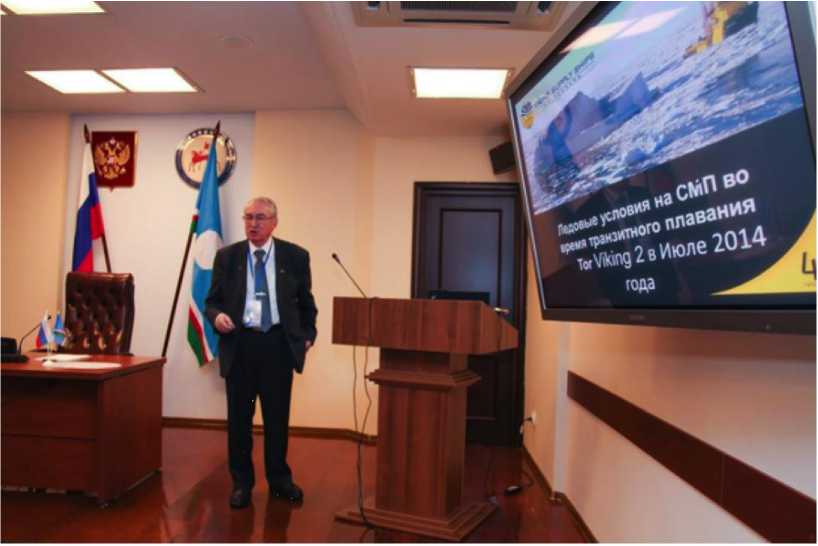
Picture 5. URL:
The report of A.A. Kugaevsky is devoted to the delivery of cargoes in the context of the transport network modernization in the Republic of Sakha (Yakutia).
Vice President of NP “Northern Sea Route” V.V. Mikhailichenko presented the information on the Arctic shuttle-transport for carrying containers along the Northern Sea Route in 2014. The report “The revival of aviation — the key to successful development and livelihoods of the Arctic regions of Russia” was presented by V.I. Skoropupov — Assistant of the Special Representative of the President of the Russian Federation for International Cooperation in the Arctic and Antarctic A.N. Chilingarov. The measures to ensure the transport infrastructure in the Arctic (for example, the state enterprise “Roads of the Arctic”) were discussed by the 1st Deputy Minister of Transport and Roads of the Republic of Sakha (Yakutia) M.R. Nikiforova. DG of JSC “Polar Airlines” A.E. Tarasov presented a paper on “Aircraft service for the Arctic areas: ways and problems”. The scheme of delivery of cargoes in the Arctic regions of the country was analyzed by the Chairman of the State Committee on the Safety of life of the population of the Republic of Sakha (Yakutia) Y.N. Zaitsev and DG of “Yakutoptorg” R.I. Fedorov.
The round table discussion “Arctic: power technologies and utilities” focused on innovation in energy and housing and communal services. At present, energy conservation and energy efficiency is an indispensable element of successful economic development, providing lower costs while reducing negative impacts on the environment. The country has already begun to use renewable energy sources -wind and solar power plants. Along with this, there is an important experience in using innovative equipment and technology at Russian enterprises and in development of alternative and renewable energy in the world.
The moderators of the round table discussion were: Deputy Minister of Housing, Public Utilities and Energy of the Republic of Sakha (Yakutia) N.N. Duraev and Candidate of Technical Sciences, senior lecturer in aircraft engines from the Rybinsk State Aviation Technical University
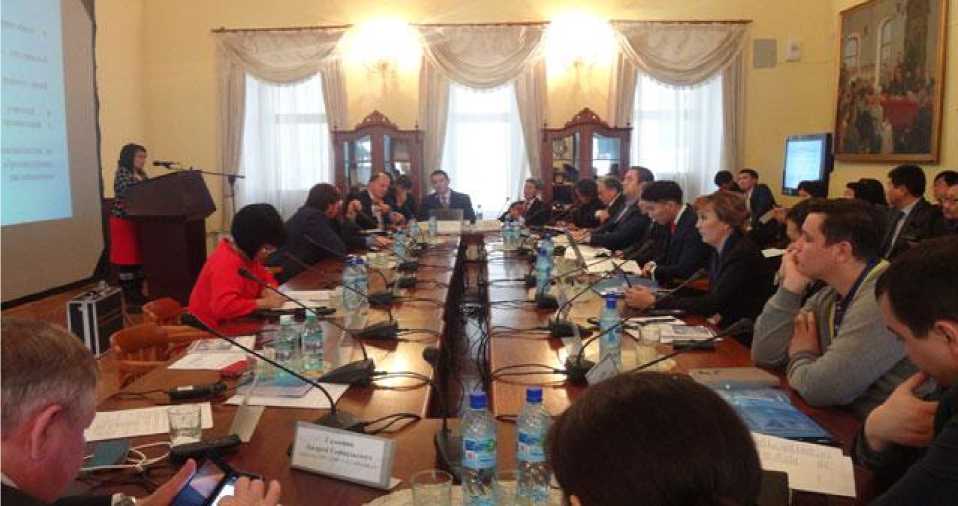
Picture 6.URL:
named after P.A. Solovyov, a leading engineer-designer of “New Energy” (Rybinsk, Yaroslavl Oblast) I.N. Novikov.
A report on the issue of delivery of fuel to heat generators in arctic conditions was made by V.S. Ignatiev, researcher at the Department of Power Engineering Problems of the Institute of Physical and technical problems of the North. The Head of the Department of Energy and Energy saving of the Ministry of Housing and Public Utilities and Energy of the Republic of Sakha (Yakutia) V.P. Emelyanov came out with the report on the problems of diesel energy in the Republic of Sakha (Yakutia). Technology utilities in Alaska (wind and diesel units) were presented by the director of the Institute of the North (USA, Alaska), Co-chair of the Arctic Energy Summit Nils Andreassen.
The problems of waste, converting solid household and industrial waste into gas, diesel and electricity with the use of bioenergy BHKW-facility were told by Candidate of Technical Sciences, Technical Director of the “Grimi s.r.o.” (Slovakia) M.F. Logunov. Moderator I.N. Novikov presented a report on destruction of biological and medical waste. The Technical Director of the “Progress-energy” (Yaroslavl) G.L. Rassokhin continued this theme and came out with a report on waste disposal via fast pyrolysis reactor.
DG of the ”Center of energy saving and new technologies of the Republic of Sakha (Yakutia)” S.S. Popov and Head of Administration MO “Deputatsky” S.G. Bondarenko presented the experience of Deputatsky village of the Ust-Yansky District in energy saving in the framework of an energy service contract for the housing stock.
The round table discussion “Introduction of information and communication technologies in the Arctic” noted that the territorial remoteness of the northern area, the lack of efficient infrastructure and communication facilities exacerbate the need in information and communication technologies (ICT) and their integration into a single information space for Arctic residents. The moderators of the round table discussion were: the Minister of Communications and Information Technologies of Sakha (Yakutia) A.I. Borisov and Professor at the University of Aix-Marseille (France) Sébastien Gadal.
Modern medical laboratory at the size of a suitcase had been shown by the Deputy DG of “Mikord” (Kazan) V.B. Tikhomirov. Qualification of paramedics in the rural areas does not allow a diagnosis on a number of complex diseases. With the help of a mobile complex all the information about a particular patient's disease could be transmitted to the physician on a single medical information card.
Experts in the field of education were presented a distance education technologies and reports on the preservation of the cultural heritage of indigenous peoples.
Professor from the University of Aix-Marseille Sébastien Gadal described the role of remote monitoring systems in the Arctic, possible to be used to observe different weather processes in the Arctic. Telecom operators have reported on their activities and prospects of development in the Arctic regions of the country. The report of the engineer of the “Radio Engineering Corporation “Vega”(Moscow) A.A. Nikolaev introduced a technological solution — a mathematical model of a passive Wi-Fi repeater range for CAD package CST Microwave Studio 2014 and calculations for a prototype with basic parameters. The representative of the inter-regional branch of the “Far East” OJSC of the “Rostelecom” N.Y. Masich spoke about the plans of his company in the Far East.
Development and implementation of a new generation of building materials and techniques based on innovative technologies were discussed at the round table meeting “Innovations in Arctic building”. The moderators of the round table discussion were: the Minister of Architecture and Building of the Republic of Sakha (Yakutia) V.A. Kuzakova, Doctor of Technical Sciences, Director of Engineering and Technical Institute of the North-Eastern Federal University named after M.K. Ammosov T.A. Kornilov.
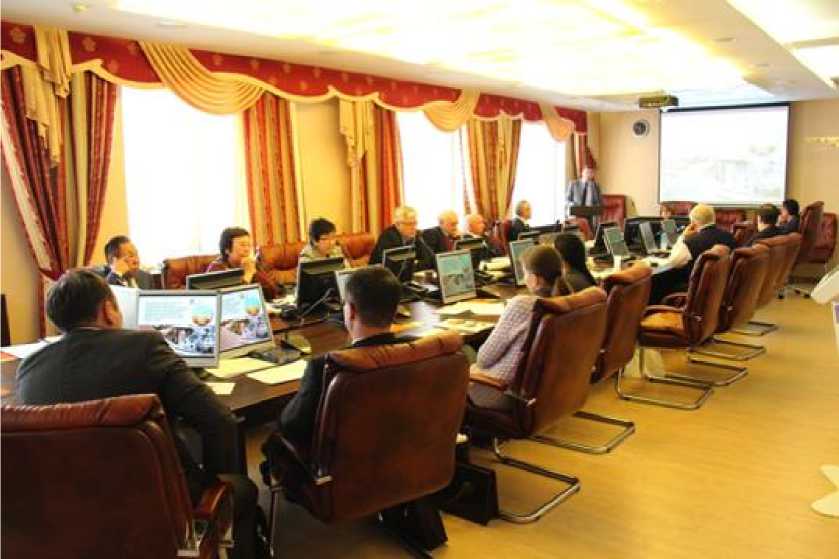
Picture 7. URL:
The main report “Global environmental change and sustainability of the cryolithozone and reaction of the engineering structures” was made by the Doctor of Geological-mineralogical Sciences, Head of the Department of Geocryology at the Geological Faculty of the Moscow State University named after M.V. Lomonosov A.V. Brushko. He suggested assessing the consequences of the possible scenarios of global warming on the basis of existing ideas about the temperature of perennial frozen strata using any of to quantify the degradation of the permafrost zone.
World's first engineering-geological map of the Republic of Sakha (Yakutia) was introduces by the Institute of Permafrost named after M.I. Melnikov, SB RAS headed by Doctor of Geological-mineralogical Sciences V.B. Spektor. The map could be applied as the means of the information support for the planning, implementation and operation of large engineering structures in the country.
Prospects for production of the foam glass — ceramics “turmogran” from the local raw zeolite were presented in the report of A.D. Orlov, Candidate of Technical Sciences., Deputy Chief of the department of house-building innovative technologies CNIISK named after V.A. Kucherenko. The foam glass — ceramics “turmogran” produced in Yakutia meets the key requirements for building in the North and Yakutia in particular — the thermal and mechanical properties at the level of foam glass at a minimum cost and the local resource base.
Report of the DG of the Centre for European Construction Technology (St. Petersburg) S.A. Startseva focused on renovation of the facade panel buildings with the use of innovative technologies at low temperatures. The reports of the participants presented the results of research on innovation in construction in the Arctic: effective ways of building a foundation and foundation structures, suggestions for structural and technological solutions of houses, volume-spatial solutions for dwellings and settlements.
Participants of the round table discussion “Preservation of traditional lifestyles and economics of the peoples of the North” focused on the preservation of culture, traditional way of life of indigenous peoples of the Arctic as it is a unique example of human adaptation to the climatic conditions of the Far North. Today, there is a greater interest in further development and use of resources in the Arctic, and the invasion of nature reserves, which are home for the peoples of Arctic and territory of traditional nature. In this regard it is vital for indigenous peoples to have their rights reflected in the legal support of industrial development. Worldview of indigenous peoples must be taken into account when deciding the socio-economic development of the areas where they live. Meanwhile, in December 2013, the territory of traditional nature deprived of the status of protected areas. The territory of indigenous people is no longer a subject to the restrictions in the turnover of land legislation. There is a need to adopt certain legal acts on the territories of indigenous peoples at the federal level, as well as to establish sanctions for violation of rules and regulations.
The moderators of the round table discussion were: Deputy Prime Minister of the Republic of Sakha (Yakutia) P.N. Alekseev and Chairman of the Standing Committee of the National Assembly (Il Tumen) of the Republic of Sakha (Yakutia) on indigenous peoples and Arctic affairs E.H. Golomareva.
The meeting was attended by Russian and foreign scientists from Moscow, Yakutsk, Norway and by leaders of public associations of indigenous peoples, including the Association of Indigenous Peoples of the Republic of Sakha (Yakutia), the Association “World Reindeer Herders' Council of Elders of Indigenous Peoples North”, the Council of Elders of the Yukaghir people, Evenki Association of Sakha (Yakutia), the Union of Sakha (Yakutia), the Association of the Chukchi of Sakha (Yakutia), the Association Dolgan Sakha (Yakutia), the Association Yukagirs Sakha (Yakutia).
During the discussion of the prospects for preservation and development of traditional economics of indigenous peoples, the participants highlighted the need to improve the legal framework in the field of traditional land use and an increase in research projects focused on ethno-cultural, ecological and economic aspects of resource use in the Arctic.
The round table discussion “Arctic tourism” brought together the participants interested in the development of tourism. Russian Arctic due to its unique geographical location, the availability of a wide variety of flora and fauna has considerable recreational potential for tourism development. This is a beautiful wilderness, the presence of more than two hundred of protected areas. Here there is more than 70% of the world finds of mammoth soft tissue. The moderators of the round table discussion were: Minister for Enterprise and Tourism Development of the Republic of Sakha (Yakutia), E.I. Kormilitsyna and Advisor of the Director of the National Park “Russian Arctic” V.S. Kuznetsov.
The meeting was attended by Head Lapland province Mika Riipi, Lecturer from School of Technology and Business, Dalarna University Albina Pashkevich and professor of the Umeå University Olof Shёrnstrem. Among the participants it was possible to see: First Deputy Prime Minister of the Republic of Sakha (Yakutia), P.A. Marinychev, President of the Academy of Sciences of the Republic of Sakha (Yakutia) I.I. Kolodeznikov, representatives of local authorities, tourism and business of Sakha (Yakutia), representatives of scientific organizations, educational institutions, university students and a group of schoolchildren.
The concept of Arctic tourism Republic of Sakha (Yakutia) for the period up to 2025 was introduced by Candidate of Economical Sciences, Director of the “Center for Strategic Studies of the Republic of Sakha (Yakutia)” V.I. Kondrateva. In a report on the development of tourism in the national park “Russian Arctic” Candidate of Economical Sciences, Advisor of the Director of NP “Russian Arctic” V.S. Kuznetsova informed about the development of tourism in the reserve of federal importance “Franz Josef Land”, an active work they make to attract tourists and the organization of virtual tours through the national park.
Active discussion and great interest among the participants of the round table discussion was caused by the issues of sustainable tourism development as a basis for specialization of the Arctic regions (Mika Riipi’s speech), world trends of tourism development (A.F. Khorosheva’s presentation), as well as the swim across the Bering Strait (K.N. Bolsheva’s speach). Archeological heritage of Yakutia, and its contribution to the archaeological (scientific) tourism was discussed by Doctor of Historical Sciences, Director of the Center of Arctic archeology and paleoecology of human AS RS (I) S.A. Fedoseyeva.
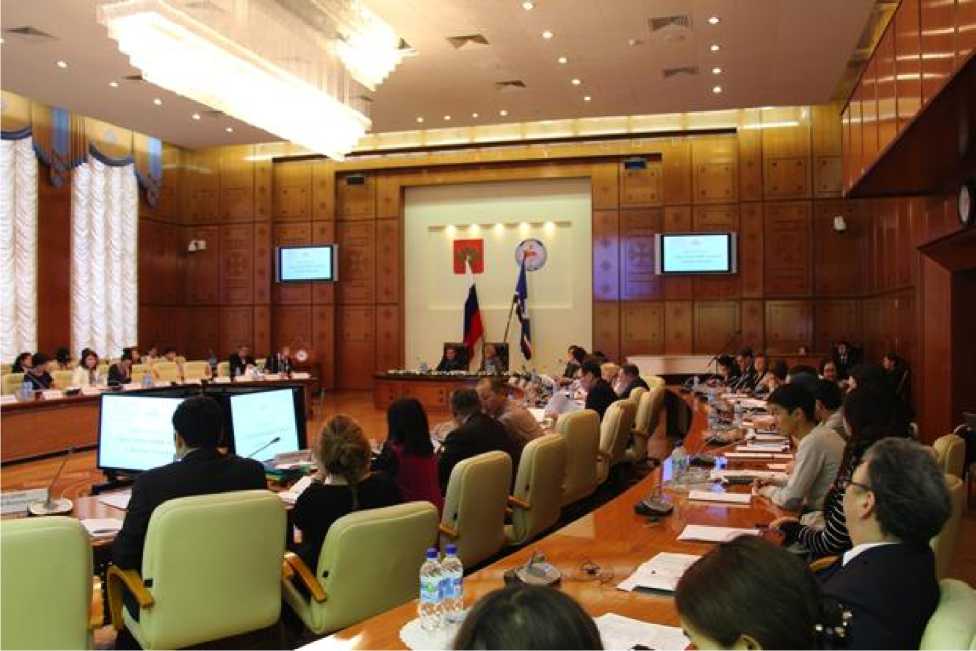
Picture 8. URL:
The need for a sustainable socio-economic development for the production in the harsh climatic conditions and the current quality of life was discussed at the round table meeting “Arctic model of sustainable development: a new perspective” . However, it should be adapted to arctic conditions and system of socio-economic planning and development of businesses in the Arctic. New innovative approaches require the organization of public administration on the Arctic territories, investments, formation of the legal regulators and legal frameworks to secure the Arctic region as a special object of government.
The moderators of the round table discussion were: Deputy Chairman of the State Assembly (Il Tumen) V.N. Gubarev; Doctor of Economical Sciences, Professor, Senior Researcher, Institute for Economic Research, Far Eastern Branch of the Russian Academy of Sciences S.N. Leonov; Deputy Minister of Economy of Sakha (Yakutia) E.A. Chekin. Keynote was addresses by S.N. Leonov in the report “Problems and prospects of development in the Arctic Russian Far East” and E.G. Egorov, Doctor of Economical Sciences, professor, academician of the Sakha Republic (Yakutia), Chief researcher at the Institute of Regional Economy of the North NEFU named after M.K. Ammosov in the speech ”Comparative analysis of models of Arctic economies of the world”. S.N. Leonov highlighted the incompleteness zoning of the Arctic Russia, the aggravation of institutional regulatory issues of development and the formation of a rational system of settlement of the Arctic in his report.
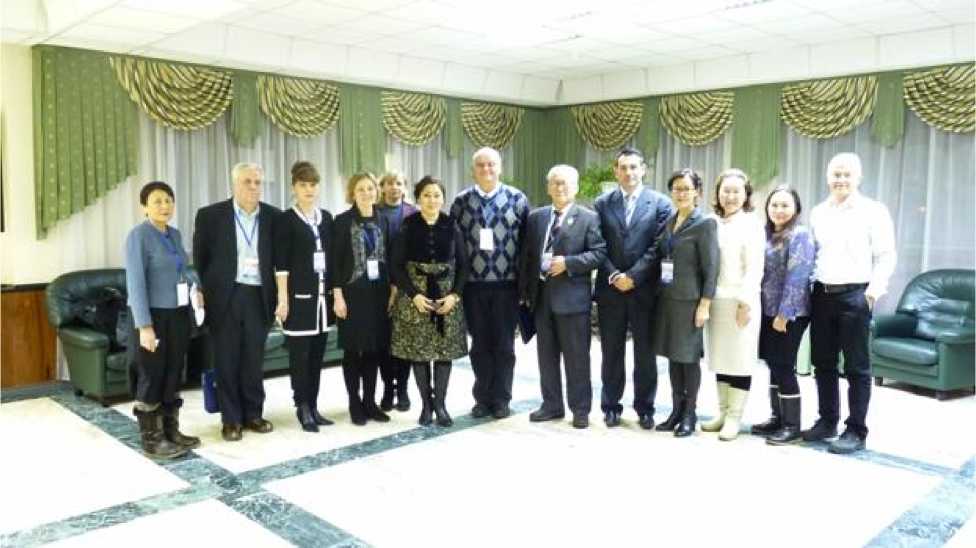
Picture 9. URL:
Discussion of the problems of sustainable development was attended by Sébastien Gadal, PhD, professor at the University of Aix-Marseille (France); Thor Gertsen, Associate Professor University of the Arctic Norway (Alta, Norway); representatives of scientific organizations from St. Petersburg, Murmansk University, Yakutsk Scientific Center, Russian Academy of Sciences, NorthEastern Federal University named after M.K. Ammosov, the Ministry of Economy of Sakha (Yakutia), the media and university students. The participants of the of the round table meeting were especially interested in the report made by the research staff of the St. Petersburg State Polytechnic University Doctor of Economical Sciences N.I. Didenko and Doctor of Economical Sciences D.F. Skripnyuk — “Modeling of Sustainable Development of the Arctic zone of the Russian Federation: ADL-model”, and the report of the lecturer from the NEFU named after M.K. Ammosov, Candidate of Economical Sciences. I.N. Nikulkina — “Improving the mechanisms of the state fiscal policy implementation in the Arctic zone of the Russian Federation”
More information about the round table discussions could be found in the column “Results of the Conference”:

